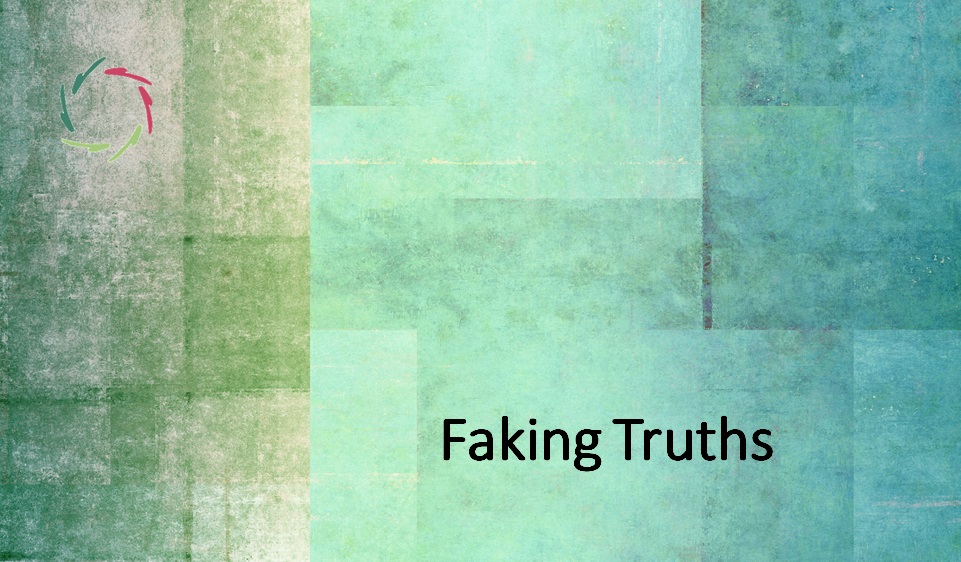Faking Truths – Meaning over Facts

Why do people want to believe what they want to believe as if ‘truth’ is something that can be wanted into reality?
2020, the year of the truth?
Hmm. We are rather in an era of untruth. Fake news, alternative truths, etc. The phenomenon is mounting. It will mount more with new technological possibilities.
“Images speak for themselves,” but even videos can be morphed into letting someone – in a faked video – say anything you want. Herein lies the danger of that specific faked video, of course, and the fake message it brings from the mouth of a real (?) person. An additional, possibly more significant danger is that one cannot trust any footage anymore. Soon, they can all be faked.
‘Seeing before believing,’ as we know it, becomes illusory.
Anything can be faked. Is this the end of truth or the beginning of an intense search for truthfulness?
2020, the year of COVID, and of much stress, and of many people, in reaction to this stress, becoming more vulnerable than ever to a deluge of fake news, COVID-related and other.
The primary question may seem: Why are people so vulnerable to obviously fake news? Why don’t they do what is best for them? However, one question comes before that:
Do people eventually prefer fakeness over realness?
By nature, people are not fact-seekers but meaning-seekers ― seeking facts because of their meaningfulness.
Those who think themselves to be rational are abhorred by the avalanche of fakeness. Rightfully so, but we should all look inside ourselves. In history, time and again, those who think themselves to be holding the truth – even as a large group or caste – have been proven wrong by the next bunch of truth-holders. Are we beyond that at present?
Before shouting, “Of course!” it may be worthwhile to put ‘seeking for truth’ on a higher pedestal than truth itself.
Will we ever find the ultimate truth?
No [see: “What is Ultimate Truth?“]
But that should not lead to a total relativism. Seeking truth always comes before truth. In seeking truth lies the worthiness, even when truth itself cannot be attained. If we stop seeking it within an ever more complex world, we are toast.
People hold on to ideas because these are meaningful to them.
This is related to the microstructure of our brain, abounding with neuronal patterns and patterns of patterns. [see: “Human Brain: Giant Pattern Recognizer“] A pattern is meaningful if it is broadly anchored and influences many other patterns.
This way, what accords to a meaningful pattern has a higher chance of being caught and valued. Intelligent individuals seem to be more prone to this, probably related to the quantity and quality of patterns. A smart person is not, therefore, less vulnerable to fake truths. He may be better able to give them a place. Much depends on how much he holds on to what is mentally comfortable.
Therefore, intelligent people should put even more effort into seeking the truth.
If you can put meaning into someone’s brain, you can put anything there.
Again, please, don’t put too much of your stakes in facts and rationality directly. Better see them as the content of a vehicle. The vehicle itself is meaningfulness. You need that for bringing facts and rationality, indirectly.
Brainwashers are well aware of this, either explicitly or implicitly. They massively bring meaning – then, ‘facts,’ which may be any fake truth as long as the vehicle is powerful.
The same counts if you want to deradicalize someone or just make him culturally open even if his cultural patterns have been engrained from the cradle.
The same counts if you want to let someone see ‘the truth,’ or at least something a bit closer to this than a blatantly wrong and dangerous chimera.
The same counts if you want to educate children, or even to teach them anything at all.
Meaning comes first.
If this is not taken into account, people can seem incredibly recalcitrant to the truth. They may see truth-seekers as meaningless. They may see the efforts of these (‘fact-checking’) as degrading.
If it is taken into account, the picture changes dramatically.


